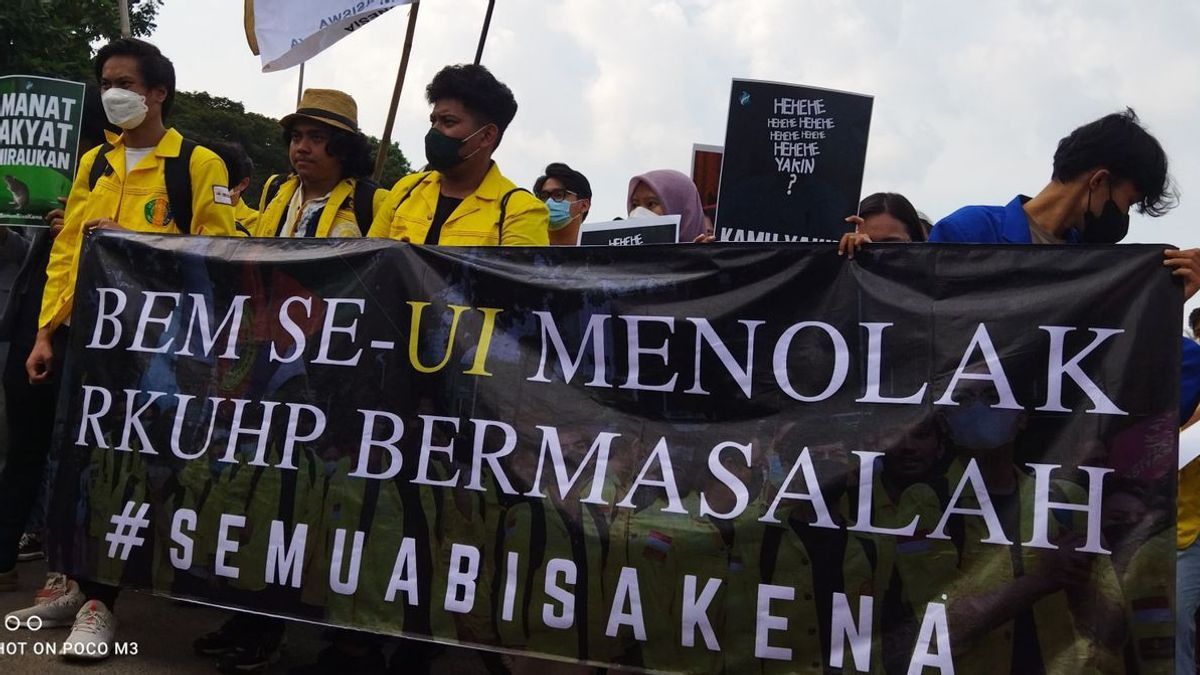YOGYAKARTA The Indonesian House of Representatives (DPR) will ratify the Draft Criminal Code (RKUHP) through a plenary meeting scheduled for today, Tuesday, December 6, 2022. The ratification of the RKUHP will still be carried out even though several parties have stated that there is a controversial article on the RKUHP.
The rejection of the ratification of the RKUHP itself occurred several times and was carried out by several parties, including civil society to students. However, the agenda for ratification is still carried out by the DPR RI. So what articles are considered controversial?
There are several articles that are in the spotlight of the public, such as related to insulting the president, the death penalty, demonstrations, and several other articles. The following summary is presented for you.
Articles that are in the spotlight and have received many rejections, one of which is insults directed at the government, general power and state institutions. This is regulated in Articles 240 and 241 of the 2019 version of the RKUHP draft which states that acts of insult to the government can be subject to a maximum imprisonment of 3 years.
"Every person who publicly insults a legitimate government which results in riots in society is sentenced to a maximum imprisonment of 3 (three) years or a maximum fine of category IV," reads Article 240.
Meanwhile, insults to public power and state institutions are listed in the draft Articles 353 and 354 of the 2019 version of the RKUHP draft which states that the perpetrators of insults can be imprisoned for up to 3 years.
The incitement or treason against the general ruler can be subject to criminal charges. This is regulated in Articles 246 and 247 of the 2019 version of the RKUHP draft.
Article 246 states that inciting the general ruler can be sentenced to a maximum prison sentence of 4 years.
"Punished with a maximum imprisonment of 4 (four) years or a maximum fine of category V, every person in public orally or in writing; a) incites people to commit crimes; or b) incites people to fight the general ruler with violence", read 246.
Article 218 to Article 220 draft RKUHP 2019 is regulated in connection with criminal charges against the honor or dignity of the president and vice president. It is said that the punishment given is in the form of imprisonment of up to 3.5 years and a fine.
"Everyone who publicly attacks the honor or dignity of the president or vice president shall be punished with imprisonment for a maximum of 3 (three) years and 6 (six) months or a maximum fine of category IV," said Article 218 Paragraph (1).
The sentence can be heavier to a sentence of up to 4.5 years if the insult is carried out through social media. This is stated in Article 219 of the draft RKUHP.
The public can also be subject to criminal penalties when holding a demonstration without prior notification. This is stated in the draft RKUHP Article 256.
"Everyone who without prior notice to those authorized to hold parades, demonstrations, or demonstrations on public roads or public places that result in disruption of public interest, causing trouble, or chaos in society, shall be punished with imprisonment for a maximum of 6 (six) months or a maximum fine of category II".
The public also highlighted the RKUHP which regulates sentences for suspects in criminal acts of corruption. In the new manuscript, namely Article 603, the punishment of corruptors is said to be a maximum of two years in prison and a maximum of 20 years. In addition, fines are given at least category II or IDR 10 million while a maximum of IDR 2 billion.
"Everyone who unlawfully commits acts of enriching themselves, others, or the corporation that harms the state's finances or the country's economy, shall be punished with life imprisonment or imprisonment for a minimum of 2 (two) years and a maximum of 20 (twenty) years and a minimum fine of category II and a maximum of category VI."
The draft RKUHP also regulates penalties for perpetrators of sexual intercourse outside of marriage, namely Article 413 paragraph (1) the fourth part of licensing. It is said that the perpetrator can be imprisoned or fined category II.
"Every person who has intercourse with a person who is not his husband or wife is convicted of adultery with a maximum imprisonment of 1 (one) year or a maximum fine of category II," reads Article 413 paragraph (1).
This punishment can apply if there are parties who complain or there is a complaint offense. Meanwhile, parties who can complain are husbands or wives who are bound by marriage, parents or children for people who are not bound by marriage.
Spreaders or someone who develops the teachings of communism, marxism, and leninism can be jailed for 4 years as stipulated in Article 188 concerning Criminal Acts of State Ideology. In paragraph 1 Article 188.
"Everyone who spreads or develops the teachings of communism/mexism-lenism in public or writing, including spreading or developing through any media, shall be sentenced to a maximum imprisonment of 4 (four) years".
The threat could increase by up to seven years if the crime was carried out to replace Pancasila as the basis of the state. Not only that, the sentence could continue to increase by 15 years if the activity resulted in riots and caused casualties.
The perpetrator of the ticketing can be jailed for up to 1.5 years. This is stated in Article 252 paragraph (1) which states that someone who claims to have supernatural powers who harms can be imprisoned for 1 year and 6 months.
"Everyone who claims to have supernatural powers, tells, gives hope, offers, or provides services to others that because their actions can cause illness, death, or mental or physical suffering of a person, shall be punished with imprisonment for a maximum of 1 (one) year 6 (six) month or a maximum fine of category IV."
The draft RKUHP is also still regulated regarding the death penalty, namely in Articles 67, 98, 99, 100, 101, and 102. In addition, it is also regulated technically the implementation of the death penalty as stated in Article 99.
Some considered that the death penalty should be abolished because the sentence was not in accordance with human rights principles.
That's information related to the controversial article of the RKUHP. To get other interesting information, visit VOI.ID.
The English, Chinese, Japanese, Arabic, and French versions are automatically generated by the AI. So there may still be inaccuracies in translating, please always see Indonesian as our main language. (system supported by DigitalSiber.id)













